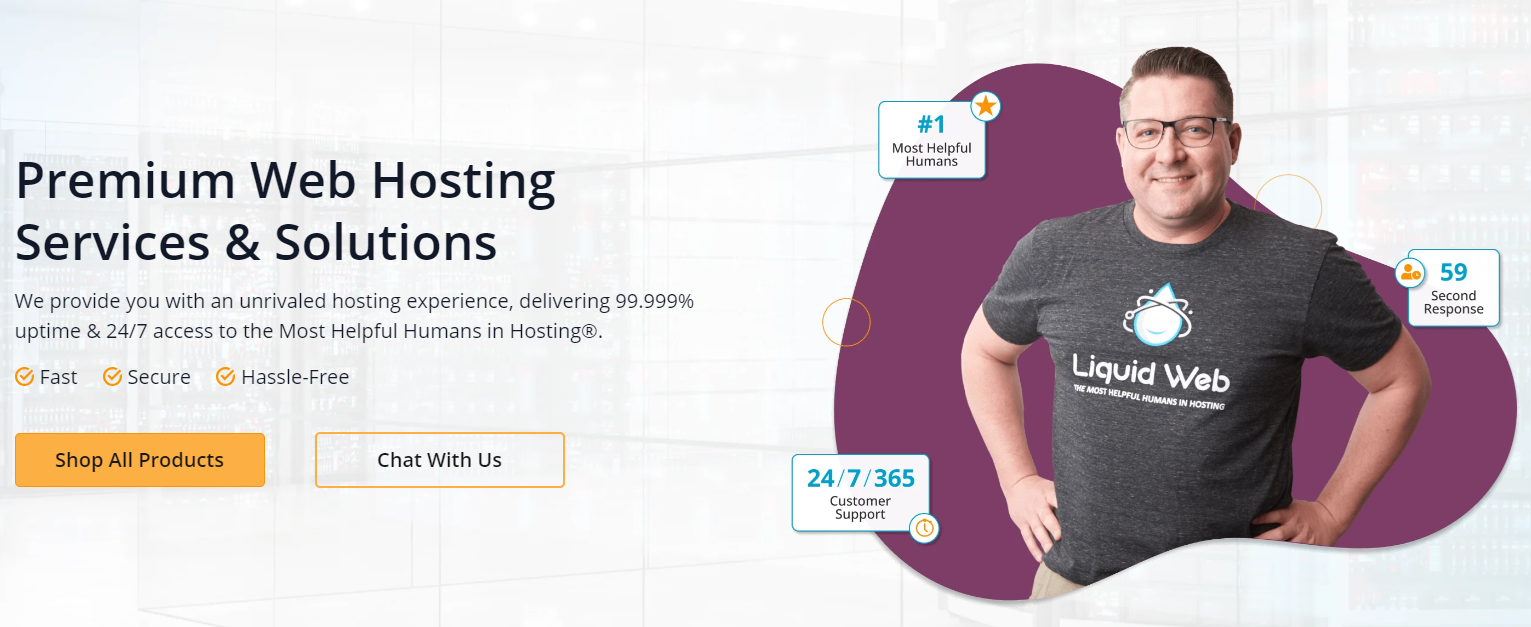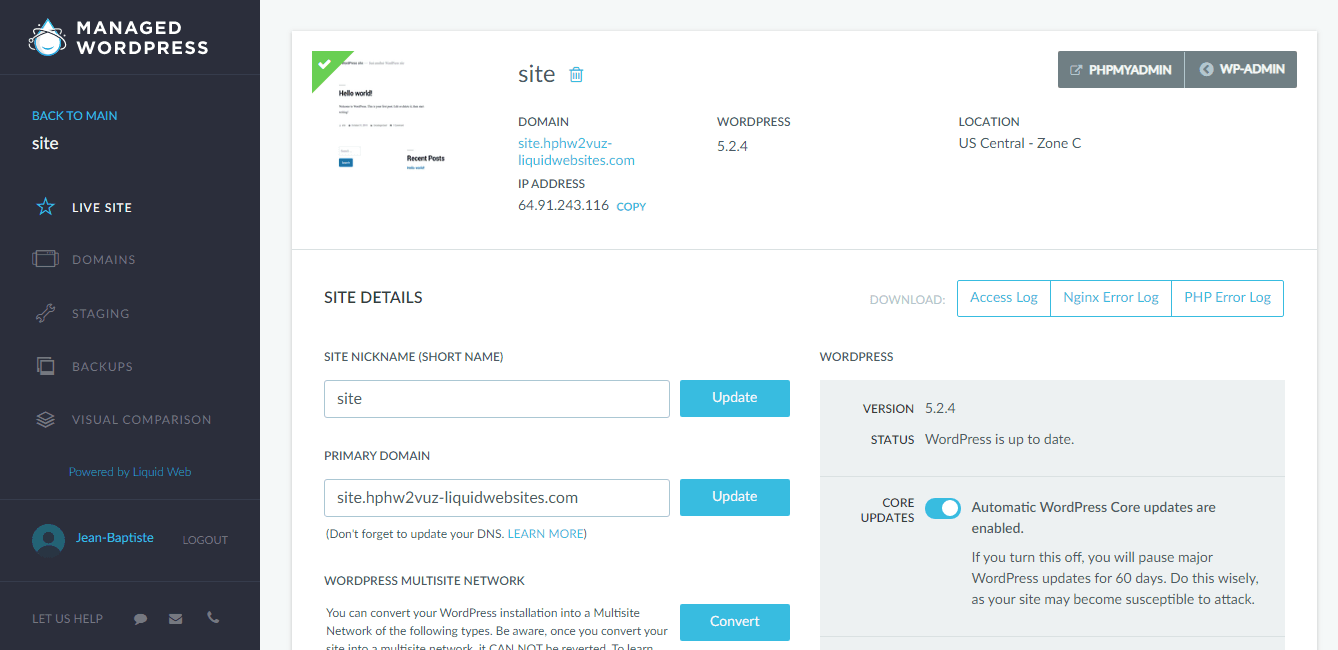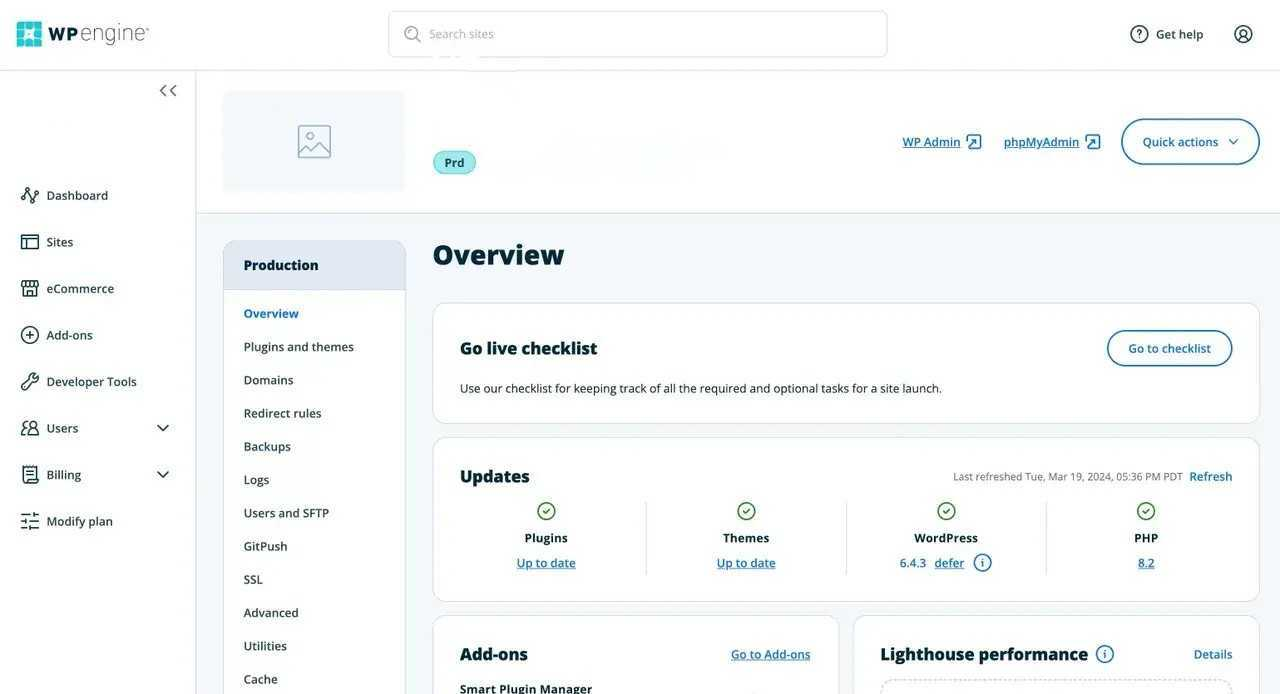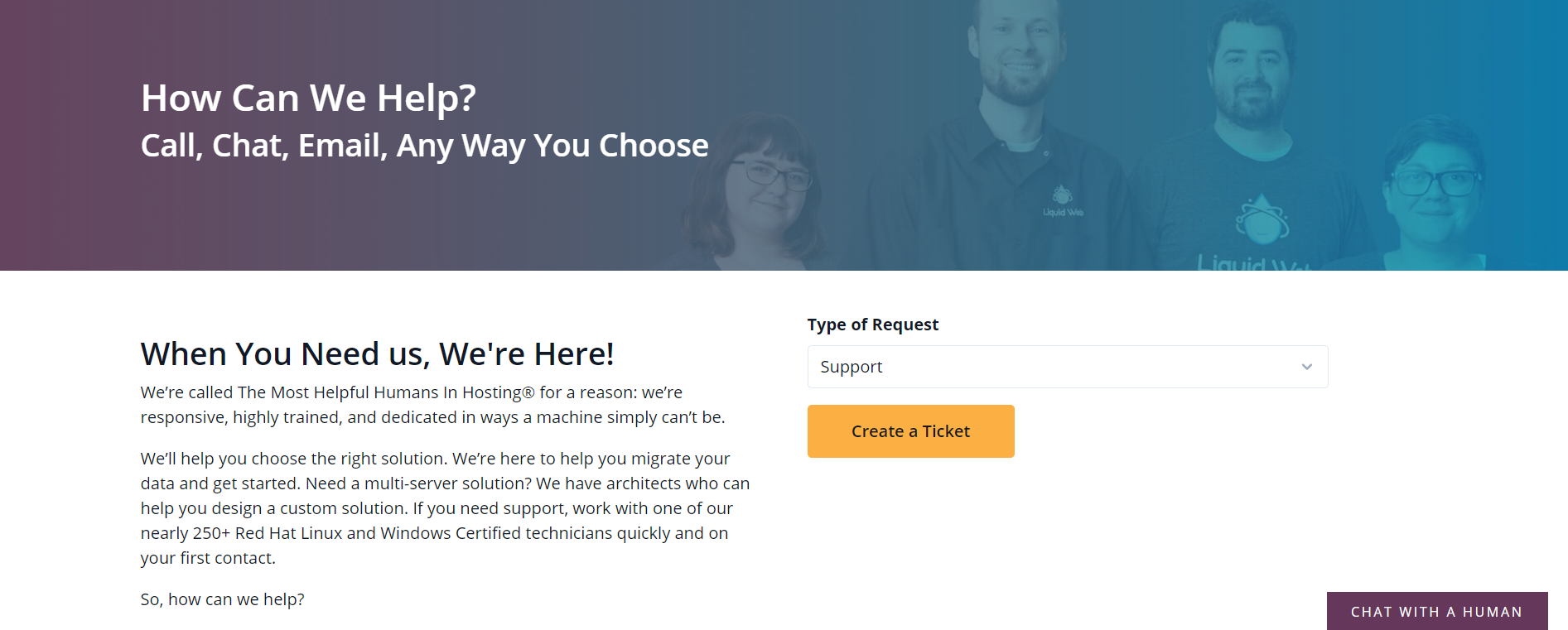WP Engine vs Liquid Web: Final verdict
Comparing WP Engine and Liquid Web reveals that both have their own unique strengths tailored to different user needs.
-
WP Engine (Overall grade: 8.6)
focuses on providing specialized managed WordPress hosting with features like EverCache® technology, free automated migrations, premium themes, and highly optimized performance. Its user-friendly interface and strong customer support make it suitable for businesses and developers seeking streamlined management and superior speed. WP Engine excels in uptime and security, further bolstered by global data centers and advanced threat detection capabilities. However, its higher price points may be a drawback for smaller projects or budget-conscious users, though many find the quality of service to be worth the premium.
Liquid Web (Overall grade: 8.4)
offers a versatile range of hosting solutions, including VPS, dedicated, cloud, and WooCommerce hosting, making it ideal for high-traffic websites and compliance-heavy industries. It boasts strong hardware, high availability, and comprehensive support, including a 59-second initial response guarantee, which positions it as a reliable provider for more complex environments and businesses requiring stringent compliance like HIPAA or PCI. While Liquid Web lacks a dedicated website builder, it compensates with extensive user management options and robust migration services. Despite some customer reports of declining service quality, Liquid Web’s broader compliance offerings and flexible hosting types make it a viable choice for businesses with more diverse needs.
 Overall grade:8.6 |
 Overall grade:8.4 |
|
|---|---|---|
| Uptime and Availability | 9.6 | 9.2 |
| Hosting Performance | 9.1 | 7.7 |
| Hosting Security | 9.4 | 9.3 |
| Price | 8.1 | 8.0 |
| Hosting Features | 6.8 | 6.4 |
| Ease Of Setup | 8.3 | 8.7 |
| User Management | 8.8 | 8.3 |
| Customer Support | 8.9 | 9.4 |
| User feedback | 4.6/5 | 4.3/5 |
Hosting types offered
Both platforms provide a variety of hosting types, each designed to meet the different needs of users.
 |
 |
|
|---|---|---|
| Shared hosting | ||
| Cloud hosting | ||
| WordPress hosting | ||
| Ecommerce hosting | ||
| VPS hosting | ||
| Dedicated hosting |
Although both offer a variety of hosting plans tailored to different needs, in
certain cases, one platform may prove to be more suitable.
Detailed comparison
Uptime and availability
Evaluates the average uptime statistics, uptime guarantee and overall availability of the hosting
provider
Score Components:
- Uptime percentage (30%): evaluates the uptime statistics in given period of time
- Uptime guarantee (20%): Assesses if the platform offers an uptime guarantee and
whether the actual uptime matches the promised guarantee. - General performance (25%): Evaluates how fast is the average response time and overall
it’s stability. - Responsiveness (10%): Adaptability to different devices and screen sizes.
- Availability (25%): Reflects the total downtime and number of outages.
 9.6
9.6
 9.2
9.2
🏆 Winner WP Engine: Reliable hosting with excellent uptime performance and comprehensive support.

WP Engine stands out with its impressive uptime monitoring and response times, ensuring your website remains accessible consistently. It offers a 99.99% SLA and global data centers, which contribute to reduced latency and high availability. The platform’s proactive maintenance and 24/7 customer support further increase your site’s reliability.

Liquid Web provides solid options with multi-server environments and a 100% uptime guarantee. Their proactive monitoring and fast hardware replacement add layers of reliability. Despite these strong features, WP Engine’s consistent 100% uptime record over a two-month period and overall site performance metrics make it the better choice for uptime and availability.
Which one has better hosting performance?
Score Components:
- Hosting speed (30%): This includes SSD quality, Load times, PageSpeed score ranges,
additional information on website speed, built-in plugins for performance enhancement, available caching
methods, and CPU/RAM options - CDN (20%): Considers whether CDN is available or not, whether it’s free or paid, and
the quality of the CDN service - Available data centers (30%): Evaluates the number of data centers and their locations
globally. - Scalibility (20%): Looks at whether elastic scaling is available, the process required
to scale (manual upgrade vs. automatic scaling), the presence of dedicated servers, and the costs
associated with scaling.
 9.1
9.1
 7.7
7.7
🏆 Winner: WP Engine: Known for its incredible speed and reliability.
Both WP Engine and Liquid Web offer impressive hosting features, but WP Engine takes the lead. WP Engine boasts fast page load times through its EverCache® Technology and a global CDN with over 200 points of presence. Liquid Web, while using high-speed AMD EPYC and Intel Xeon processors, doesn’t match WP Engine’s seamless load times. WP Engine also excels with data centers across multiple continents, ensuring global accessibility. Liquid Web offers a fast 10 Gbps network but doesn’t provide a managed CDN like WP Engine. WP Engine’s latest PHP versions and Core Web Vitals optimization further enhance its speed.
Website Speed
WP Engine ensures top-tier website speed with optimized WordPress-specific rules and EverCache® Technology. Their platform also runs on the latest PHP versions, capable of handling up to three times more requests per second. With a free fully-managed CDN and a focus on Core Web Vitals, WP Engine delivers a superior user experience. Liquid Web, though competitive with its NVMe or SSD storage and high-performance processors, does not provide the same level of speed enhancements or managed caching mechanisms as WP Engine, making WP Engine the winner for website speed.
Scalability
WP Engine offers a highly scalable architecture that can handle traffic spikes effortlessly. Their isolated resources ensure performance and reliability without needing manual upgrades. On the other hand, Liquid Web provides scalable VPS hosting with easy upgrades and cloud dedicated servers, but the specifics of scaling costs aren’t clear. WP Engine’s automated scaling and free automated migration plugin make scaling smoother for most users. Liquid Web’s autoscaling feature is free but includes more manual involvement compared to WP Engine’s streamlined approach.
Which one has better security features?
and regulatory requirements
Score Components:
- Technical security measures (40%): This includes encryption, firewalls, DDoS
protection, secure configurations, server monitoring, access control and availability of security addons
(e.g Sitelock security). - Operational security measures (30%): Encompasses data privacy, backups and data
redundancy. - Compliance and certifications (20%): Adherence to legal and regulatory requirements
(e.g., GDPR, HIPAA) and possession of certifications (e.g., ISO 27001, SOC 2). - Business and reliability (10%): Factors in the provider’s reputation, uptime
guarantees, and customer support.
 9.4
9.4
 9.3
9.3
🏆 Winner
WP Engine: A robust and advanced hosting solution with comprehensive security features and layers of protection.
Both WP Engine and Liquid Web, have notable differences in their approaches to technical and operational
security, as well as in their compliance with regulations.
Technical security measures:
WP Engine uses enterprise-grade technology to automate threat detection, blocking 72 million attacks daily, and continuously monitors over 26 billion attacks per year. It also includes advanced edge protection, managed WAF, DDoS mitigation, and Argo Smart Routing through Global Edge Security. Liquid Web offers hardened server configurations, firewalls, VPNs, and web application firewalls, along with real-time DDoS attack protection and F5 AIP Intrusion Detection System, ensuring stable and secure web applications. Both providers show strong technical capabilities, but WP Engine’s proactive threat detection and comprehensive edge security offer a slight edge.
Operational security measures:
WP Engine’s always-on monitoring, proactive security alerts, live team monitoring, and visual regression test rollbacks provide a dynamic and responsive security environment. Liquid Web provides 24/7/365 on-site support, real-time monitoring, and remediation for vulnerabilities, focusing on consistent operational security. Both providers ensure daily backups and data encryption, but WP Engine’s integrated updates for WordPress core, plugins, and themes enhance its operational robustness.
Compliance and certifications:
WP Engine boasts SOC-2 and ISO 27001-2013 certifications, aligning with high standards for security and availability. It also offers PCI compliance for web hosting components. Liquid Web caters to extensive compliance needs, including PCI, GDPR, and HIPAA. It includes dedicated, VPS, and cloud hosting services compliant with HIPAA, supported by third-party audits. Liquid Web’s broad compliance offerings make it particularly suitable for businesses with stringent regulatory requirements.
 |
 |
|
|---|---|---|
SSL certificate |
Free SSL certificates |
Available |
Additional security features |
Two-factor authentication, daily backups, managed core updates, plugin updates |
Hardened server configurations, firewalls, VPNs, intrusion detection, encrypted data at rest |
PHP versions |
Not specified |
Supported |
GDPR compliance |
Not specified |
Compliant |
HIPAA compliance |
Not specified |
Compliant |
PCI compliance |
Included |
Supported |
Hosting features
Score Components:
- Domains (20%): Assesses the availability of a free domain, domain purchase options, and
pricing - Email (15%): Considers if the provider offers full email hosting, or is reselling
third-party service, and if the email is only transactional or not - Website builder (15%): Checks if website builder is available, and it’s user
friendliness and overall the level of customization allowed. - Staging environment (20%): Determines if a staging environment is available, allowing
for testing changes before going live. - FTP & SFTP accounts (10%): Evaluates if and how easily users can access FTP and
SFTP accounts - Git and SSH access (20%): Assess whether Git is integrated into the hosting service and
if SSH access is provided
 6.8
6.8
 6.4
6.4
🏆 Winner
WP Engine: A fully managed WordPress hosting provider offering comprehensive features for businesses of all sizes.
WP Engine and Liquid Web both offer robust hosting solutions, yet they cater to slightly different user needs. WP Engine focuses on WordPress-specific hosting, providing end-to-end management, automatic updates, and a powerful combination of performance features such as EverCache® technology and a global CDN. Its built-in site speed optimization tools like Lighthouse Performance Insights and site performance investigations make it an excellent choice for WordPress users seeking a streamlined experience. Additionally, WP Engine offers free automated migrations and a selection of premium WordPress themes, making it user-friendly for beginners and advanced users alike. With a variety of plans starting as low as $20 per month, WP Engine also accommodates a range of budgets.
Liquid Web, on the other hand, provides versatile hosting services with a strong emphasis on high availability and compliance solutions, making it highly suitable for businesses requiring HIPAA or PCI compliance. It supports complex hosting environments with VMware private cloud options and managed WooCommerce hosting, ensuring seamless scalability and robust security. Liquid Web offers managed VPS hosting designed to handle data-intensive workloads, complete with benefits like high-speed networks, DDoS protection, and unlimited sites through InterWorx, Plesk, or cPanel. Their notable features include a 59-second initial response guarantee for support, underscoring their commitment to customer service. Although their offerings are comprehensive, Liquid Web lacks a built-in website builder which might affect user experience for those looking to create a website without advanced technical skills.
 |
 |
|
|---|---|---|
Free domain |
No |
No |
Free SSL |
Yes |
Yes |
Email hosting |
No |
Yes |
Website builder |
No |
No |
Staging environment |
Yes |
Yes |
FTP & SFTP accounts |
Yes |
Yes |
Git and SSH access |
Yes |
Yes |
Free backup |
Yes |
No |
Money back guarantee |
No |
No |
a location.
As a result in rare cases the features mentioned here can differ from the ones you see on their websites.
Both providers support a range of users from beginners to experts with user-friendly website builders and WordPress staging areas. However, in terms of developer tools, both WP Engine and Liquid Web offer robust options including SSH access, support for multiple programming languages, and Git for version control, thus appealing to developers looking for advanced capabilities.
Email services:
WP Engine does not provide email hosting services, focusing instead on website performance and security. Liquid Web, however, offers comprehensive email hosting capabilities, allowing users to manage their own email campaigns and set up transactional emails. They also support reselling third-party services like G Suite and Office 365, providing greater flexibility for businesses needing a complete communication solution.
Price
Score Components:
- Plan value (40%): What each pricing tier offers.
- Transparency and clarity (30%): Clearness of pricing structures.
- Flexibility of plans (20%): Range of options to suit different budgets.
- Hidden costs (10%): Additional expenses not included in the plan.
 8.1
8.1
 8.0
8.0
🏆 Winner
WP Engine: Offers a combination of performance, security, and features suitable for different needs.
Evaluating the pricing of plans among various hosting providers can be complex due to their differing pricing and renewal strategies. Additionally, certain plans require annual commitments, which adds to the difficulty of making comparisons. The prices listed are based on monthly commitments; plans requiring annual commitments are indicated. Additionally, although some providers offer identical plans for WordPress and shared hosting, we have created separate tables for each to enhance clarity.
Comparing WP Engine and Liquid Web reveals some distinct differences. WP Engine offers managed WordPress hosting with plans ranging from $20/month for a single site, up to $600/month for custom solutions. The features vary depending on the plan but generally include 24/7 support, security enhancements, backups, and performance optimizations. On the other hand, Liquid Web provides a wider variety of hosting types, including WooCommerce, WordPress, VPS, and dedicated servers, with prices ranging from $20/month for basic VPS to $1,095/month for enterprise-level WordPress hosting. Unique offerings include autoscaled PHP workers, generous storage capacities, and bandwidth, making Liquid Web a versatile choice.
 |
 |
|---|---|
|
Startup $20
Type: Managed WP, Sites: 1, Storage: 10GB, Bandwidth: 50GB, 24/7 Chat support, SSL, SSH, backups, CDN, Premium themes, 99.99% SLA. Value for price:8.2
|
Spark $21
Type: Managed WP, Sites: 1, Storage: 15GB, Bandwidth: 2TB, 24/7 support, SSL, 10 PHP workers, Auto-scaled PHP workers. Value for price:7.0
|
|
Professional $40
Type: Managed WP, Sites: 3, Storage: 15GB, Bandwidth: 125GB, 24/7 Chat & Phone support, SSL, SSH, backups, CDN, Premium themes, 99.99% SLA. Value for price:8.4
|
Spark+$43
Type: Managed WP, Sites: 3, Storage: 25GB, Bandwidth: 2.5TB, 24/7 support, SSL, 15 PHP workers, Auto scaled PHP workers. Value for price:7.2
|
|
Growth $77
Type: Managed WP, Sites: 10, Storage: 20GB, Bandwidth: 200GB, Priority support, SSL, SSH, backups, CDN, Premium themes, 99.99% SLA. Value for price:7.8
|
Maker $87
Type: Managed WP, Sites: 5, Storage: 40GB, Bandwidth: 3TB, 24/7 support, SSL, 20 PHP workers, Auto scaled PHP workers. Value for price:7.5
|
|
Scale $194
Type: Managed WP, Sites: 30, Storage: 50GB, Bandwidth: 500GB, Priority support, SSL, SSH, backups, CDN, Premium themes, 99.99% SLA. Value for price:7.5
|
Executive $602
Type: Managed WP, Sites: 100, Storage: 500GB, Bandwidth: 10TB, 24/7 support, SSL, 50 PHP workers, Auto scaled PHP workers. Value for price:7.0
|
|
Custom $600
Type: Managed WP, Sites: Contact Sales, Storage: Contact Sales, Bandwidth: Contact Sales, Priority support, SSL, SSH, backups, CDN, Advanced DDoS & managed WAF, APM, WP Multisite add-on, Premium themes, 99.99% SLA. Value for price:6.8
|
Enterprise $1095
Type: Managed WP, Sites: 250, Storage: 800GB, Bandwidth: 10TB, 24/7 support, SSL, 70 PHP workers, Auto scaled PHP workers. Value for price:6.8
|
 |
 |
|---|---|
| N/A | N/A |
 |
 |
|---|---|
| N/A |
Essential $20
Type: VPS, vCPU: 2, RAM: 2GB SSD, Storage: 40GB, Bandwidth: 10TB, AlmaLinux, Free SSL. Value for price:8.2
|
| N/A |
Advanced $30
Type: VPS, vCPU: 4, RAM: 4GB, Storage: 100GB, Bandwidth: 10TB, AlmaLinux, Free SSL. Value for price:8.2
|
| N/A |
Intel Xeon E-2356G $159
Type: Cloud Dedicated, RAM: 16GB, Storage: 480GB SSD RAID-1, Bandwidth: 10TB, Linux, Free SSL. Value for price:7.0
|
As a result in rare cases the prices displayed here can differ from the ones you see on their websites.
Enterprise plans
WP Engine’s enterprise plan offers a blend of performance and flexibility starting at $600/month with customizable scaling options and advanced security features. Liquid Web’s enterprise solution, on the other hand, starts at $1,095/month and provides extensive storage and bandwidth capabilities along with advanced management features suitable for large-scale deployments. WP Engine presents a more affordable option with a strong feature set, making it a compelling choice for enterprise needs.
WP Engine vs Liquid Web: Ease of setup
platform.
Score Components:
- Site migration (25%): Assesses whether the provider offers tools for site migration,
either automated or manual, and whether these services are free or require a fee. - Admin panel usability (35%): Evaluates the type of admin panel provided, such as the
standard cPanel or a custom solution, focusing on its accessibility and user-friendliness for both
technical and non-technical users. - Setup features (20%): Examines the availability and ease of use of various setup
features, including FTP accounts, file managers, email account setup, PHPMyAdmin, and easy CDN
configuration. - Help center quality (20%): Measures the quality and accessibility of the provider’s
help center resources, including articles and tutorials.
 8.3
8.3
 8.7
8.7
🏆 Winner Liquid Web: Offering comprehensive migration support and an extensive knowledge base.
WP Engine uses a custom admin panel focused on WordPress optimization, making it accessible for both technical and non-technical users. Its panel provides a streamlined interface that covers essential settings and advanced features without overwhelming users. The design helps users easily manage domains, backups, and performance settings, with clear navigation paths and well-organized sections. The intuitive layout prioritizes simplicity while providing access to various developer tools for advanced configuration when needed.
Liquid Web, on the other hand, offers a more traditional approach. The hosting includes a standard cPanel for users who prefer familiarity, along with custom management interfaces for more complex environments. The custom interfaces are designed to cater to users of all skill levels, providing clear options and visual aids for various tasks. This dual approach ensures flexibility, allowing users to choose the setup that aligns with their technical proficiency. Additionally, their dedicated support team is readily available to guide users through any interface-related challenges.

Both WP Engine and Liquid Web offer robust migration tools. WP Engine provides a free Automated Migration plugin designed for quick and easy WordPress site transfers. If complications arise, a comprehensive manual migration guide is available, augmented by 24/7 chat support. Liquid Web also assists with site migration, covering websites, stores, and applications. Their migration services are part of the overall hosting package, and full management is provided to alleviate the burden on users. This makes transitions exceptionally smooth, irrespective of the complexity of the hosting environment.

WP Engine and Liquid Web emphasize strong help center resources. WP Engine’s knowledge base includes extensive articles, migration guides, and developer tools documentation, all supported by 24/7 expert assistance. Liquid Web takes a similar approach with its industry-leading knowledge base, regularly updated with articles and tutorials about hosting basics, security measures, and troubleshooting steps. Both platforms ensure users have the resources needed to manage their hosting environments effectively.
The platforms provide extensive knowledge bases filled with guides, how-to articles, and instructional content. WP Engine offers a wide range of resources alongside 24/7 chat and phone support. Liquid Web also boasts a detailed help center with an intuitive search function and around-the-clock support via live chat, phone, and ticketing, ensuring comprehensive user support.
User management
accessibility.
Score Components:
- Role customization (40%): Flexibility in creating and defining user roles and
permissions. - Ease of management (30%): User interface and tools for managing users.
- Access control (20%): Effectiveness of access control measures for different user
levels. - Scalability (10%): Ability to manage a growing number of users efficiently.
 8.8
8.8
 8.3
8.3
🏆 Winner WP Engine: WP Engine delivers comprehensive user management features with extensive control over user roles and permissions.
WP Engine and Liquid Web both offer solid user management capabilities, though WP Engine provides more granular control and flexibility. WP Engine allows the creation of detailed user roles with specific permissions tailored to different needs, while Liquid Web’s Plesk panel provides four predefined roles with slightly less flexibility. WP Engine shines with its Partial user roles, enabling selective access to environments, whereas Liquid Web’s roles are simpler but effective for general management tasks.
WP Engine’s interface is streamlined and user-friendly, with clear navigation options for managing users and roles. Users can be easily added, edited, and assigned roles through well-defined workflows. In contrast, Liquid Web’s Plesk interface offers a robust but slightly more complex user management system. While both interfaces are efficient, WP Engine’s setup is more intuitive, particularly for those who need to manage specific access on a finer level.
In terms of access control and scalability, WP Engine provides more detailed logging and activity tracking, which enhances security and accountability. WP Engine’s environment-specific access options allow for better management of user permissions as the number of users grows. Liquid Web, while effective, does not offer as granular a level of control over user activities, making WP Engine a more scalable option for organizations anticipating growth in user numbers.
WP Engine user roles table:
| Role | Description | Access highlights |
|---|---|---|
| Owner | Full access to all aspects of the User Portal, including administrative and financial settings. | Can create/delete sites, manage users, handle billing, and initiate/install site transfers. |
| Full (with billing) | Access to most features, including billing, but cannot delete sites or remove users. | Can make billing changes, initiate site transfers, and manage Smart Plugin Manager settings. |
| Full (no billing) | Broad access without billing capabilities. | Can accept site transfers and manage Smart Plugin Manager settings but cannot initiate transfers or handle billing. |
| Partial (with billing) | Limited access to specific environments with billing permissions. | Can manage billing within specified environments and handle environment-specific site operations. |
| Partial (no billing) | Restricted access to designated environments without billing capabilities. | Can manage specific environments, perform backups, and restore actions within those environments. |
Customer support
hosting provider.
Score Components:
- Support communication channels (30%): Measures the variety of customer support types
provided (live chat, chatbot, email, phone, etc.) - Availability (20%): Assesses the availability hours for each channel, including 24/7
support options. - Technical support quality (30%): Assesses whether the provider offers comprehensive
technical support, including hardware upgrades (e.g., HDD to SSD), software installations, and web
server configuration changes. - Enterprise support (20%): Checks if there are dedicated or priority support services
for enterprise-level customers.
 8.9
8.9
 9.4
9.4
🏆 Winner
Liquid Web: Liquid Web offers quick initial response times and comprehensive support channels, enhancing overall customer satisfaction.
 |
 |
|
|---|---|---|
Phone support |
||
Live chat support |
||
Chatbot |
||
Email/ticket support |
||
Enterprise support (dedicated agent, priority support) |

WP Engine provides 24/7/365 support through phone and chat, featuring access to WordPress experts and premium support options. Their User Portal allows for plan management, and they offer extensive self-help resources like knowledge bases and detailed guides. Their high customer satisfaction score indicates their reliability and effectiveness.

Liquid Web also offers 24/7/365 support, with impressive guarantees of initial response times for phone, chat, and helpdesk inquiries. They provide Heroic Support®, which includes access to knowledgeable technicians and managed hosting advisors. Liquid Web’s higher Net Promoter Score reflects strong customer loyalty and satisfaction. Both hosting providers feature extensive documentation and migration assistance, though Liquid Web edges out with a slightly more comprehensive and quicker support framework.
WP Engine vs Liquid Web: User feedback
WP Engine exudes excellence in managed WordPress hosting, boasting top-notch technical support that’s often highlighted as a standout feature. Users appreciate the user-friendly dashboard, seamless migration tools, daily backups, and solid security measures, all of which contribute to high performance and reliability. However, the service does come at a higher price point, which some users find steep, especially for entry-level plans or smaller projects. Despite occasional concerns about costs and some technical nuances, WP Engine’s premium service quality justifies the expense for many, making it a highly recommended solution for businesses and developers alike.
Customer feedback for this hosting provider is mixed, with significant polarization in user experiences. While some have praised the company for its reliable uptime, exceptional support, and proactive monitoring, others have experienced severe dissatisfaction due to frequent downtimes, unresponsive customer service, and unethical billing practices. Long-term customers, in particular, have noted a sharp decline in service quality and support efficiency, attributing it to recent management changes. Despite positive reviews highlighting excellent technical support and overall reliability, a growing number of users advise against using this provider due to these negative aspects.
WP Engine vs Liquid Web: FAQ
Which platform is better suited for hosting WordPress websites?
WP Engine is better suited for hosting WordPress websites due to its specialized managed WordPress hosting, built-in optimization tools, and features like EverCache® technology and a global CDN. Liquid Web, while offering managed WordPress hosting, provides a broader range of hosting options and is more versatile for different environments. For users specifically focused on WordPress, WP Engine offers a more tailored solution.
Which hosting service offers better security features?
WP Engine offers robust security features with enterprise-grade technology, blocking millions of attacks daily and providing advanced edge protection, managed WAF, and DDoS mitigation. Liquid Web also offers strong security measures including hardened server configurations, VPNs, real-time DDoS protection, and intrusion detection systems. However, WP Engine’s proactive threat detection and comprehensive edge security offer a slight edge.
Which hosting service offers more scalability options for growing websites?
WP Engine offers highly scalable architecture with isolated resources and automated scaling, making it ideal for handling traffic spikes without manual interventions. Liquid Web provides scalable VPS hosting with easy upgrades and cloud dedicated servers, but WP Engine’s smoother and more automated approach to scaling makes it better suited for growing websites.
Which service is more suitable for hosting a high-traffic website?
Liquid Web is more suitable for hosting high-traffic websites due to its high availability, server clusters, and robust performance solutions tailored for demanding environments. While WP Engine excels in speed and optimized performance for WordPress sites, Liquid Web’s broader expertise in handling high-traffic sites across varied hosting solutions makes it the preferable option for this use case.
How do the providers handle email hosting and what features are included?
WP Engine does not provide email hosting services, focusing solely on website performance and security. Liquid Web offers comprehensive email hosting capabilities, including support for managing email campaigns, transactional emails, and reselling third-party services like G Suite and Office 365, providing a flexible communication solution for businesses.
The making of this blog
We followed a clear, step-by-step process to write and research this article.








